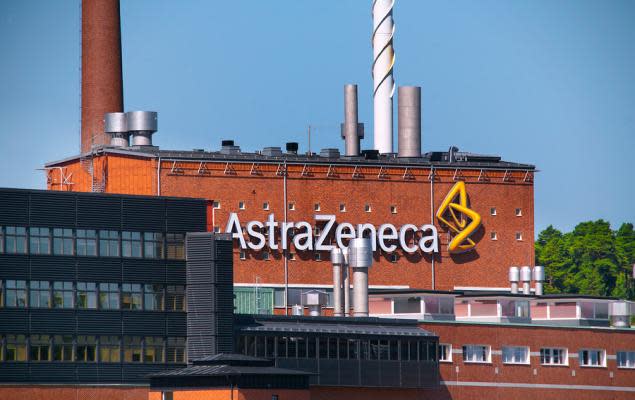AstraZeneca (AZN) Key Drugs to Aid Growth, Pipeline Strong

AstraZeneca AZN boasts a diversified geographical footprint as well as a product portfolio with several blockbuster medicines. Key drugs like Brilinta (cardiovascular), Lynparza (ovarian cancer), Farxiga/Forxiga (type II diabetes) and Tagrisso (lung cancer) are driving top-line growth, with AstraZeneca launching them in more markets and for an increased number of indications.
AstraZeneca now has 12 blockbuster medicines (excluding COVID products) in its portfolio, with sales exceeding $1 billion, including Tagrisso, Fasenra, Farxiga, Imfinzi and Lynparza. These drugs were its key top-line drivers in 2022 as well as the first half of 2023 and the trend is expected to continue.
In the first half of 2023, AstraZeneca’s sales rose 1% on a reported basis and 4% at constant exchange rates (“CER”) to $22.3 billion. Core earnings per share of $4.07 per share rose 13% year over year on a reported basis and 21% at CER. Each of AstraZeneca’s non-COVID-19 therapy areas saw double-digit revenue growth in the first half. Sales of some key medicines like Ultomiris, Imfinzi/Imjudo and Farxiga are growing rapidly, with the trend expected to continue.
Please note that AstraZeneca markets Lynparza in partnership with Merck MRK.
AstraZeneca and Merck formed a profit-sharing deal to co-market Lynparza and Koselugo in July 2017.
AstraZeneca and Merck’s Lynparza is approved for four cancer types, ovarian, breast, prostate and pancreatic. Lynparza is also being evaluated in an earlier-line setting for approved cancer indications.
AstraZeneca’s pipeline is strong. The company received 34 approvals in major markets in 2022. It is set to launch at least 15 new medicines by 2030.
AstraZeneca and partner Sanofi’s SNY respiratory syncytial virus (“RSV”) antibody Beyfortus (nirsevimab) was approved recently to protect newborns and infants in the United States. Beyfortus was approved in Europe in November 2022. AstraZeneca and Sanofi are looking forward to making Beyfortus available to protect infants in the United States and Europe ahead of the 2023 RSV season.
In January 2023, the FDA approved AstraZeneca’s Airsupra (PT027), a pressurized metered-dose inhaler, as-needed treatment or prevention of bronchoconstriction and to reduce the risk of exacerbations in adults. In 2021, the FDA approved Saphnelo (anifrolumab) for moderate-to-severe systemic lupus erythematosus. All these new products should become important contributors to top-line growth in the future quarters.
With regard to its pipeline, important oncology candidates in late-stage development are datopotamab deruxtecan (NSCLC and inoperable or metastatic HR+ HER2- breast cancer, triple-negative breast cancer), camizestrant (advanced breast cancer) and capivasertib (HR-positive, HER2-low or HER2-negative locally advanced or metastatic breast cancer, mCRPC prostate cancer).
Promising non-oncology pipeline candidates include eplontersen (hATTR-polyneuropathy and ATTR-cardiomyopathy) and danicopan (PNH with extravascular haemolysis).
Regulatory applications seeking approval for capivasertib for HR-positive, HER2-negative locally advanced or metastatic breast cancer, eplontersen for hATTR-polyneuropathy and danicopan for PNH with extravascular haemolysis are under review with the FDA.
AstraZeneca has its share of challenges. Rising inflation and interest rates, global supply chain constraints, recent bank failures and the ongoing conflict between Russia and Ukraine have increased broader economic uncertainty. Sales of its COVID products, Vaxzevria vaccine and Evusheld antibody medicine, are declining significantly.
Nonetheless, AstraZeneca expects total revenues to increase in the low-to-mid single-digit percentage in 2023 at CER, including its COVID products. Excluding the COVID products, total revenues are expected to increase in the low double-digit percentage.
Also, in 2023, AstraZeneca expects China sales to return to growth and increase by a low-to-mid single-digit percentage in 2023. AstraZeneca has been seeing slower sales growth in China since the second half of 2021. Sales in China are being hurt due to pricing pressure associated with the National Reimbursement Drug List and volume-based procurement programs. COVID-related lockdowns hurt sales further in 2022.
Want the latest recommendations from Zacks Investment Research? Today, you can download 7 Best Stocks for the Next 30 Days. Click to get this free report
Sanofi (SNY) : Free Stock Analysis Report
AstraZeneca PLC (AZN) : Free Stock Analysis Report
Merck & Co., Inc. (MRK) : Free Stock Analysis Report
